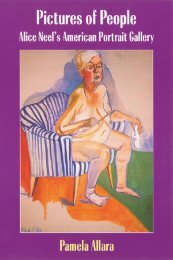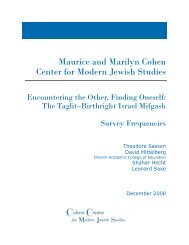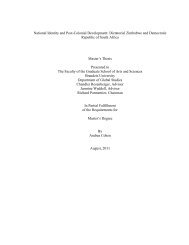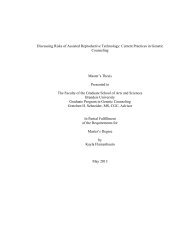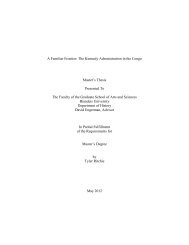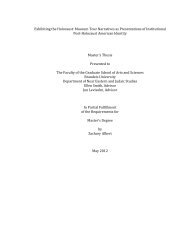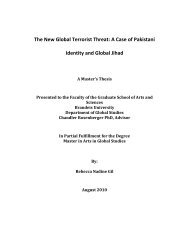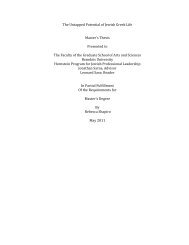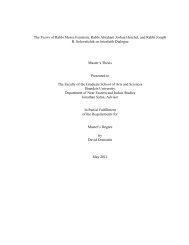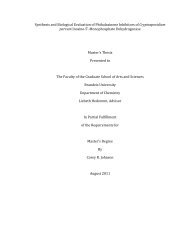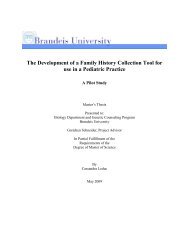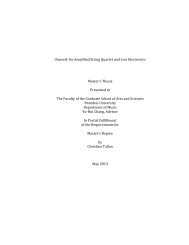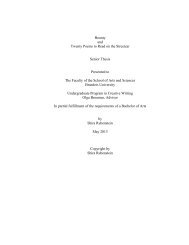Ezra Taft Benson and the State of Israel - Brandeis Institutional ...
Ezra Taft Benson and the State of Israel - Brandeis Institutional ...
Ezra Taft Benson and the State of Israel - Brandeis Institutional ...
- No tags were found...
Create successful ePaper yourself
Turn your PDF publications into a flip-book with our unique Google optimized e-Paper software.
many Americans that <strong>Israel</strong> was now, more than ever, “America's small but muscularcohort in <strong>the</strong> Cold War.” 157While 1967 represented a shift in American public opinion in favor <strong>of</strong> <strong>Israel</strong>, for<strong>Ezra</strong> <strong>Taft</strong> <strong>Benson</strong>, we find no such transformation. As noted in chapter two, his rhetoricregarding his support for <strong>Israel</strong> remained largely unchanged from 1950 to 1976. Hissupport revolved around <strong>the</strong> notion that <strong>the</strong> Jewish people were, <strong>and</strong> had alwaysremained, God's chosen people, <strong>and</strong> that since Latter-day Saints shared in thatappellation, Jews <strong>and</strong> Latter-day Saints were siblings in <strong>the</strong> House <strong>of</strong> <strong>Israel</strong>. Likewise,he, like his evangelical contemporaries, saw <strong>Israel</strong>'s presence in <strong>the</strong> Middle East asfulfillment <strong>of</strong> prophecy, sanctioned by God, <strong>and</strong> confirmation <strong>of</strong> o<strong>the</strong>r Mormonprophecies regarding <strong>the</strong> ga<strong>the</strong>ring <strong>of</strong> <strong>the</strong> Jews in <strong>the</strong> last days. Little information isaccessible regarding <strong>Benson</strong>'s personal feelings about <strong>the</strong> Sinai Campaign <strong>of</strong> 1956, whilehe was in <strong>of</strong>fice, or <strong>the</strong> Six-Day War <strong>of</strong> 1967. While various remarks in newspaperarticles <strong>and</strong> o<strong>the</strong>r public documents reveal his constant support <strong>of</strong> <strong>Israel</strong>, <strong>the</strong>y do notcomment on <strong>the</strong> events <strong>the</strong>mselves. We can only surmise, <strong>the</strong>refore, that his feelingstoward <strong>Israel</strong> changed little even through those pivotal events, <strong>and</strong> wonder about <strong>the</strong>deeper feelings he may have held regarding <strong>Israel</strong>'s involvement in those decisive wars.In any case, his remarks at <strong>the</strong> 1960 Stake Conference in Washington, D.C., reveal hisappreciation <strong>of</strong> <strong>Israel</strong>'s relationship with <strong>the</strong> United <strong>State</strong>s, <strong>and</strong> <strong>the</strong>ir promotion <strong>of</strong> “<strong>the</strong>principles <strong>of</strong> freedom <strong>and</strong> liberty.” 158 True to his hope for <strong>the</strong> spread <strong>of</strong> (American)Democracy <strong>and</strong> <strong>the</strong> demise <strong>of</strong> Communism, <strong>Benson</strong> saw <strong>Israel</strong> as an important bastion <strong>of</strong>democratic principles in <strong>the</strong> Middle East.157158Oren, Power, Faith <strong>and</strong> Fantasy, 527.<strong>Benson</strong>, Stake Conference Address, 9.50



